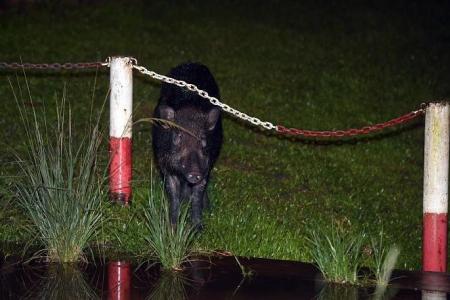More wild boar carcasses here test positive for African swine fever
Seventeen more wild pigs infected with African swine fever (ASF) have been recorded in Singapore, with the deadly pig virus reported in new locations including forested areas in the west and on Pulau Ubin.
The disease, caused by the virus of the same name, affects only wild boars and pigs. It is not zoonotic, meaning it does not infect humans.
While Singapore does not have any pig farms, wild boars are native to its forests. There were about 150 to 200 of these animals in the nature reserves, according to a study by the National Parks Board (NParks) from 2019 to 2020.
Responding to queries from The Straits Times, NParks’ group director of the Animal and Veterinary Service Chang Siow Foong said on Thursday the new cases were largely found in the north of Singapore.
He said: “(The disease) is endemic in South-east Asia and spreads mainly through infected wild boars and pigs, and contaminated materials.
“NParks is currently studying how ASF came to be found in wild boars in Singapore, and is closely monitoring the situation.”
A month ago, the board announced that Singapore had confirmed its first case of the virus on Feb 7, which had been detected in a wild boar carcass in the north-west of the island.
ASF is a typically fatal disease first identified in sub-Saharan Africa. Since the highly contagious disease was reported to have arrived in the Asia-Pacific in 2018, millions of pigs have been culled in an attempt to limit its spread.
In February, wildlife experts told The Straits Times that ASF will likely decimate Singapore’s wild boar population with its mortality rate of more than 90 per cent.
Dr Chang said: “There is currently no vaccine or treatment for ASF.
“Wild boars that exhibit signs of the disease will be euthanised on welfare grounds, and carcasses found will be disposed of.”
Fifteen of the infected wild boars here were found dead while the remaining three were killed and disposed of after they were trapped near Lorong Asrama, according to a report on the World Organisation for Animal Health website dated Feb 24.
Of the carcasses, six were discovered on Pulau Ubin in the north-east of Singapore, the highest in the Republic to date.
Another four carcasses were found in a forested area in Tengah.
The other cases came from forested areas and nature parks in the west and north of Singapore, including Sungei Buloh Wetland Reserve.
Dr Chang said: “NParks has a biosurveillance system in place to quickly detect animal diseases, including ASF. Wild boars are native to Singapore and can be found in our nature reserves, parks, and other green spaces. NParks is closely monitoring the health of wild boars in these areas. “
Since ASF was detected here, the Philippines and Taiwan have imposed tighter restrictions on the import of pork products from Singapore.
On Monday, the Philippines’ Department of Agriculture slapped a temporary ban on travellers carrying pig products from Singapore. The ban includes products carried by hand like pork, pig skin and pig semen.
Dr Chang reminded the public to stay on designated trails when visiting nature reserves, parks and other green spaces, observe wild boars from a distance and to avoid feeding or getting close to the creatures.
He said: “We advise the public not to touch or pick up any sick or dead animals.
“Members of the public should call the Animal Response Centre at 1800-476-1600 to report such sightings.”
Get The New Paper on your phone with the free TNP app. Download from the Apple App Store or Google Play Store now


